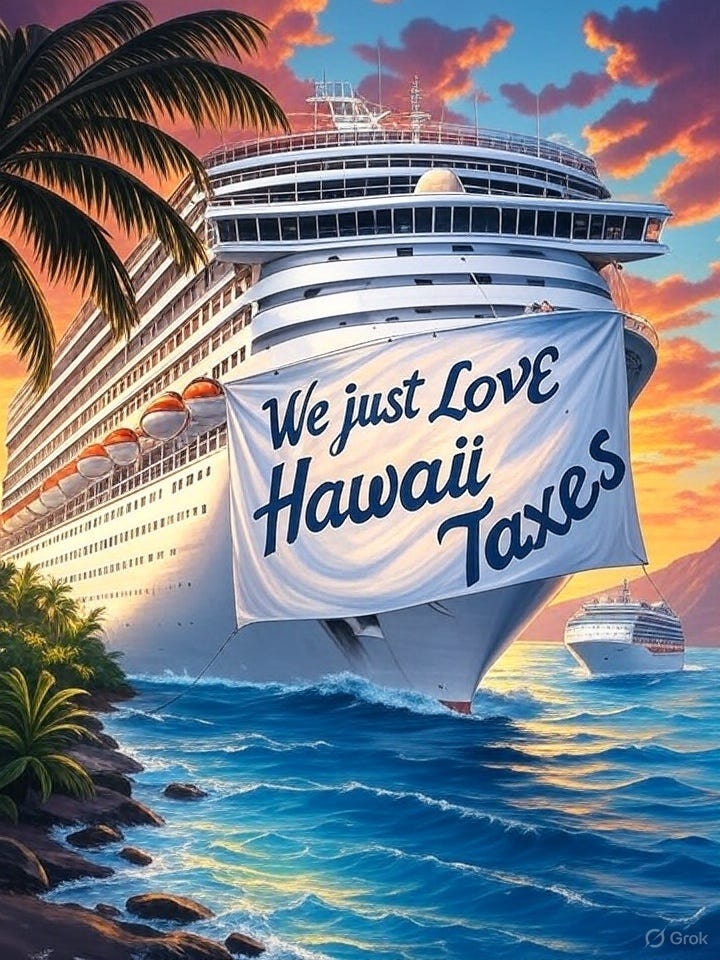Hawaii's Eco-Tax Trap: Forcing Cruise Lines to Broadcast Unconstitutional Overreach
The state's 'Green Fee' is an affront to the First Amendment.
Imagine sailing into the azure waters of Hawaii, the land of aloha, only to be greeted not just by swaying palms and ukulele strums, but by government-mandated posters on your cruise ship proclaiming the state's latest eco-tax triumph. Sounds like a bad dream? Well, welcome to the nightmare of Act 96, Hawaii's so-called "Green Fee" law, which doesn't just slap a hefty surcharge on cruise passengers—it's also forcing cruise lines to become unwilling billboards for the state's dubious revenue scheme.
This latest Hawaiian escapade isn't just unconstitutional; it's a tropical twist on the kind of compelled speech that would make even the most zealous censor blush. Let's break it down, because the devil is in the details, and in this case, the details are drowning in a sea of First Amendment violations.
Act 96, set to kick in on January 1, 2026, imposes an 11% surcharge on the prorated gross fares of cruise ships docking in Hawaiian ports, with counties piling on another 3% for good measure. That's potentially hundreds of millions in new fees over the next decade, funneled not toward actual port services (which cruise lines already pay for handsomely), but into general "green" projects like climate initiatives.
The Cruise Lines International Association (CLIA), along with local businesses that rely on tourism, has sued in federal court, arguing the fee violates the Tonnage Clause (which bars states from taxing ships just for showing up) and the Rivers and Harbors Act (a federal law designed to keep waterways free from such tolls). But here's the speech-chilling kicker: To enforce this mess, Hawaii requires cruise operators to plaster notices about compliance on every ship and slip similar disclaimers into every advertisement for Hawaii-bound voyages.
Compelled speech? In paradise? Aloha means hello and goodbye, but apparently, it also means "shut up and say what we tell you." The First Amendment has long protected against this exact brand of government puppeteering. As the Supreme Court reminded us in Wooley v. Maynard (1977), you can't force someone to be a "mobile billboard" for an ideological message they disagree with—like those New Hampshire license plates blaring "Live Free or Die."
More recently, in National Institute of Family and Life Advocates v. Becerra (2018), the Court struck down California's attempt to make crisis pregnancy centers advertise for abortion services, calling it an "unduly burdensome" intrusion on speech. And let's not forget the Ninth Circuit's en banc smackdown in American Beverage Association v. City and County of San Francisco (2019), where soda companies successfully fought a mandate to warn about sugary drinks on their ads. The court held that compelled commercial speech must be "reasonably related" to a substantial government interest—and if that interest is bogus, the whole house of cards collapses.
That's precisely what's happening here. Hawaii's "interest" in these disclosures? Administering a fee regime that's rotten to the core, built on constitutional quicksand. If the underlying surcharge is invalid—as the lawsuit convincingly argues—then the state has zero legitimate stake in forcing private companies to promote it. It's like making a restaurant post signs saying, "We're complying with our illegal health code violations—bon appétit!" The notices don't just inform; they compel cruise lines to endorse the state's narrative, turning every ship deck and ad campaign into a propaganda platform for a tax grab disguised as environmental virtue-signaling.
Critics might say, "Come on, it's just a notice—harmless disclosure." But that's the slippery slope of speech suppression. Start with forcing businesses to parrot tax compliance, and soon you're mandating ideological disclaimers on everything from hotel brochures to airline tickets. Hawaii, of all places, should know better. This is a state that prides itself on cultural openness and natural beauty, yet here it is, leveraging its island monopoly to bully out-of-state visitors and businesses.
The irony is thicker than poi: In the name of protecting the environment, Hawaii is polluting the marketplace of ideas, compelling speech that could deter tourism and hurt local economies. CLIA's members, who bring nearly 300,000 visitors annually and pump over $600 million into the state, aren't anti-green; they're anti-government overreach. And the local plaintiffs—like Honolulu Ship Supply and Aloha Anuenue Tours—stand to lose big if cruises reroute to friendlier shores.
This isn't just about cruises; it's a symptom of a broader affliction where governments treat the First Amendment like an optional luau accessory. We've seen it on campuses, where speech codes silence dissent in the name of "safety," and now it's washing up on Hawaii's beaches. If states can force companies to advertise their own unconstitutional schemes, what's next? Mandating oil companies to post climate warnings on gas pumps? Forcing tech firms to disclaimer their "addictive" algorithms? The Framers didn't enshrine free speech to let bureaucrats play ventriloquist with private entities.
The federal court in Hawaii should act swiftly to enjoin Act 96's speech mandates, reminding the state that the Constitution isn't a suggestion—it's the law of the land, even in paradise. Striking this down wouldn't just protect cruise lines; it would reaffirm a core principle: Government can tax and regulate, but it can't conscript your voice to do its dirty work. Otherwise, the aloha spirit risks becoming just another compelled slogan, fading into the sunset of forgotten freedoms.



